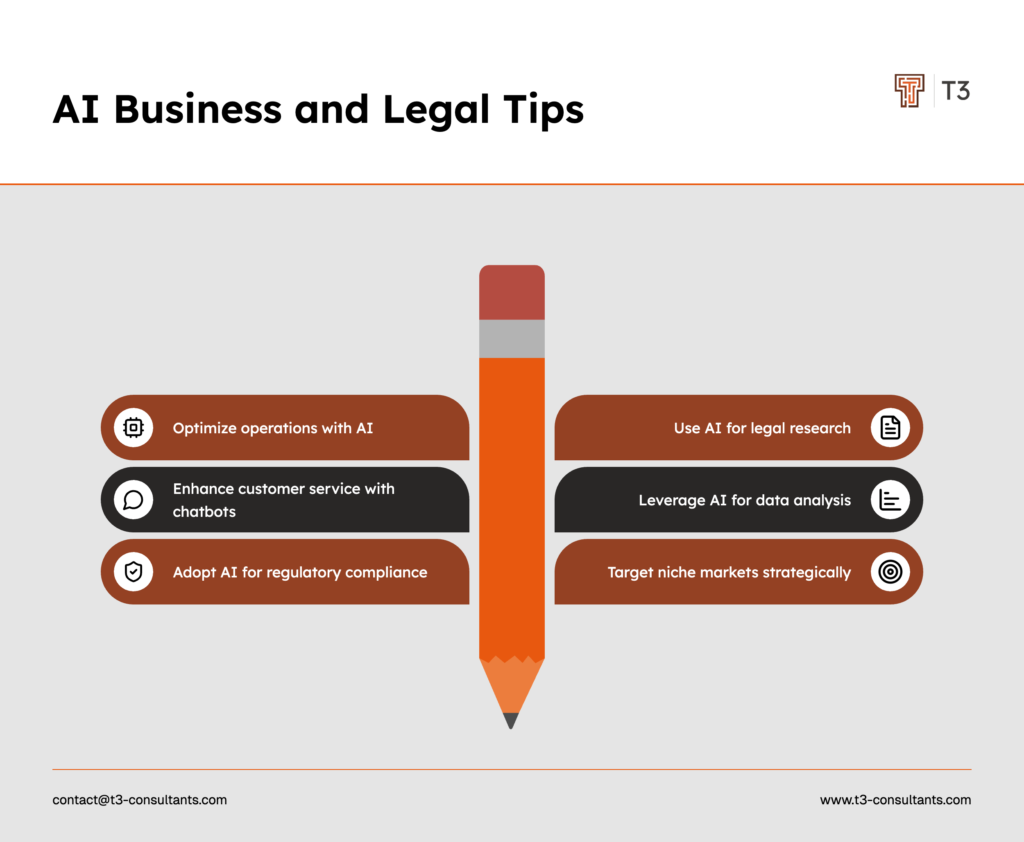
Leveraging AI: Small Law Firms Competing with Giants
Artificial Intelligence (AI) is revolutionizing how businesses operate, bringing transformative changes across various industries. It refers to the simulation of human intelligence processes by machines, particularly computer systems, encompassing technologies such as machine learning, natural language processing, and robotics. In the business sector, AI is redefining service delivery, optimizing operations, and improving decision-making through advanced data analysis and automated systems. AI is available as off-the-shelf tools or customized solutions depending on the scale and specification of a business.
The deployment of AI tools allows companies to benefit from process automation, advanced analytics, and the optimization of various operations for enhanced performance and competitiveness within the industry. Forced to allow open competition, today’s firms have to keep tabs on their tax expenditures, and AI can do this by computing. Small firms need to leverage accounting and tax services to access competitive edge and the AI-generated insights depending on the cost or likelihood of tax evasion on goods and services.
Historically, startups and large tech companies have been the main users of AI-generated insights; startups leverage AI tools to structure their firms and gain market advantage over their competitors, while large tech companies use AI to increase their economies of scale through computation and storage via cloud services. These companies have been on a path of exponential growth since they opened, fueled by their ability to open economies of scale through computation and storage through cloud services. They achieved a competitive edge due to their ability to open economies of scale through AI, allowing the companies to charge premiums higher than in the past.
AI is a set of ideal solutions to business problems that arise from how people discover, use, and pay for products. Thus, small firms must use AI to create ideal solutions to a business’s maturing technology needs. Movir is the biggest company in China known for setting prices in the cloud computing industry; its competitors, including Amazon, Microsoft, and Google, use AI to set prices. If the Federal Trade Commission (FTC) finds that firms have collaborated to raise the prices, small firms can use AI to compare charges with many others being used by various companies.
AI as a Disruptor in Legal Services
The use of AI in legal services has disrupted the industry by enhancing and improving technology on legal discovery and research processes. Incorporating AI has reformed the operations of law firms through the automation of repetitive tasks and simplifying legal processes. Initially, legal research was done manually, and it was time-consuming and labor-intensive. AI technology has revolutionized legal research by developing tools and applications that review large volumes of legal text, sought-after prior negotiations and cases, and legislation.
AI has integrated tools and applications in the discovery process, which have improved the search functionality. The technology has improved and accelerated sifting through vast amounts of documents with greater accuracy. AI is remarkably useful in e-discovery, helping lawyers classify, tag, and prioritize documents based on appropriateness, which enables them to compile and build complicated cases faster. Implementing AI in legal procedures has enhanced productivity and reduced errors and approximations. AI technology has the capability to sift through large volumes of documents and prepare them efficiently.
For most small and medium-sized companies, integrating AI can minimize the competition gap with big companies. AI empowers these firms by enhancing outcomes and reducing the number of people required to execute the work. This results in cost savings, which can be reinvested to create more work and provide higher client satisfaction to the firms.

Thriving in the Shadows of Giants: Effective Strategies for Small Firms Competing Against Larger Corporations
In today’s business world, small firms find themselves competing against large companies with more resources and market power. However, small firms and tech startups are developing success strategies to capture their share, even in a competitive environment.
- Adaptability and Customization: Small companies can pivot more effectively than large corporations and can meet unique demands from their customers promptly. Thus, they provide customized offerings and services that larger companies would find hard to scale.
- IT Utilization: By using cloud AI and data analytics, tech startups can improve information storage, analysis, and decision-making.
- Strategic Plans: Involves being cost-effective for small companies and attracting customers to expand the business.
- Niche Marketing: Small companies can focus on unique market sectors, channeling resources into a dedicated market with unique needs and wants.
Tackling the Regulatory Challenges of AI
With the rise of technology, tackling the regulatory challenges in artificial intelligence (AI) is among the most challenging aspects. The Federal Trade Commission (FTC) and other authorities are responsible for developing and implementing regulations to ensure that AI technologies are responsibly developed and used.
Coping with regulations and adhering to them presents several difficulties:
- Transparency: AI systems must be transparent in their outcomes and abilities to avoid violations of FTC regulations.
- Data Protection: Ensures AI systems handle personal and sensitive information appropriately.
Regulatory compliance education, consulting, and implementing compliance programs are crucial in reducing risks and borrowing trust from stakeholders.
Examples of Small Companies Using AI to Succeed
Many small companies have discovered the power and potential of incorporating AI technology into their growth and operations. Here are a few examples:
- Customer Service Automation: A small company implemented AI-powered chatbots, improving response times and customer satisfaction, leading to a 30% increase in sales over three months.
- Efficiency with AI Analytics: A digital marketing firm used AI tools to analyze and report efficiently, increasing client retention rates by 25%.
- Economic Support with AI: An e-commerce company reduced logistical expenses by 20% using AI-driven algorithms.
The Future of AI in Law Firms: Embracing Innovation and Responding to Change
The upheaval of AI in law firms is expected to transform the legal stage through high-tech innovations and efficiency. Legal issues are increasingly being handled in cloud computing, allowing law firms to manage extensive data ethically and efficiently. AI’s predictive analysis will enable new possibilities in legal trends and outcomes.
Ultimately, AI provides a competitive edge, revolutionizing businesses through streamlined processes, increased accuracy, and deep data analysis. Small law firms must consider adopting AI tools to remain competitive and prevent obsolescence.
